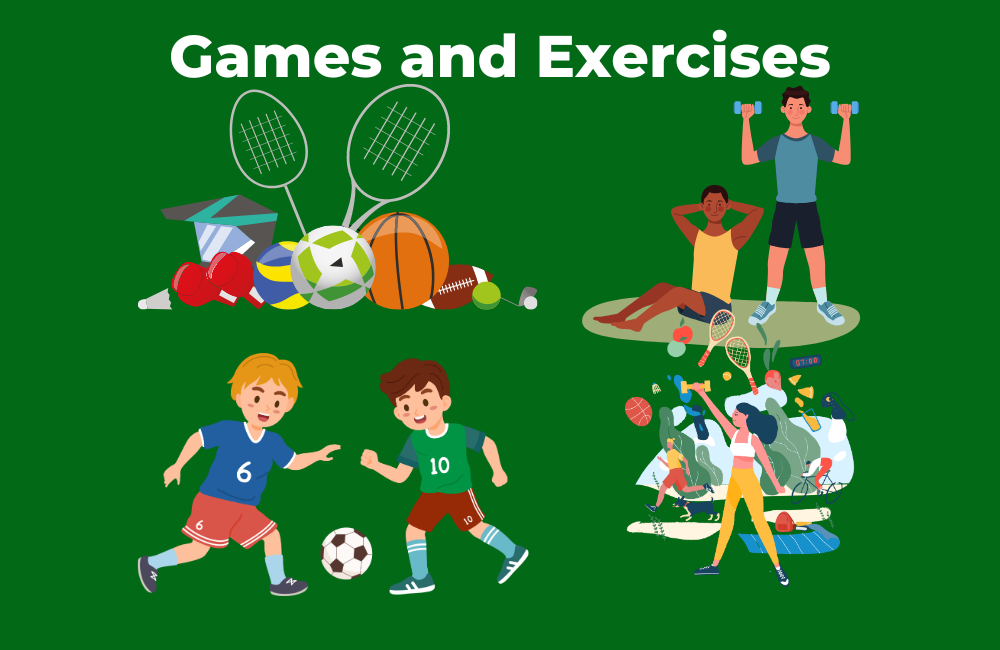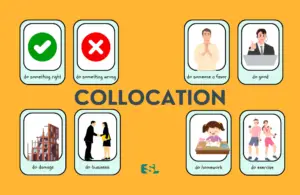This article covers the following areas –
- Basic Game Terminology
- Physical Exercise Terms
- Board and Card Game Terms
- Digital Gaming Vocabulary
- Adventure and Outdoor Activities
- Team Sports Jargon
- Individual Sports Terms
- Sample Conversation Using Terms to Talk About Games and Exercises
- Final Words
- FAQ: Terms to Talk About Games and Exercises in English
When discussing games and exercises in English, a myriad of terms come into play. Whether you’re a coach, a player, an enthusiast, or simply someone looking to understand the language nuances in this arena, it’s essential to be familiar with the right terminology. This article dives deep into various categories of words and phrases commonly used when talking about games and exercises, helping you converse confidently and clearly in these contexts.
If you are searching for an effective English language vocabulary builder, try Word Power Made Easy: The Complete Handbook for Building a Superior Vocabulary (Amazon Link). This time-tested classic has helped millions achieve mastery of English and improve their communication skills in business, the classroom, and in life.
Basic Game Terminology
Before diving into the advanced jargon, let’s start with some basic terms frequently used in gaming.
| Word/Phrase | Meaning/Usage | Example Sentences |
|---|---|---|
| Game | An activity with rules in which people or teams compete | “She won the game with a last-minute goal.” |
| Player | A person participating in a game | “The player scored three points.” |
| Team | A group of players playing together | “Which team are you supporting?” |
| Score | Points earned during a game | “The final score was 3-2.” |
| Win | To achieve victory in a game | “Our team managed to win at the last second.” |
| Lose | To not achieve victory | “It’s okay to lose as long as you learn from it.” |
| Tie | Equal score for both sides | “The game ended in a tie.” |
| Referee/Umpire | Person who ensures the rules are followed | “The referee gave him a yellow card.” |
| Opponent | A player/team competing against another | “Our opponents were very strong today.” |
| Strategy | A planned way of playing to win | “Their strategy during the second half was brilliant.” |
| Timeout | A short break in the game | “The coach called for a timeout.” |
Physical Exercise Terms
When discussing workouts and physical health, these are the terms you might come across.
| Word/Phrase | Meaning/Usage | Example Sentences |
|---|---|---|
| Exercise | Activity to improve health and fitness | “Regular exercise is key to a healthy lifestyle.” |
| Reps | Short for repetitions; the number of times an exercise is performed | “Do three sets of 10 reps each.” |
| Sets | A group of repetitions | “I did four sets of squats today.” |
| Warm-up | Light exercises to prepare the body | “Always warm up before a workout.” |
| Cardio | Exercises that raise your heart rate | “Running is a great cardio workout.” |
| Strength training | Workouts to increase muscle strength | “She focuses more on strength training.” |
| Flexibility | The ability of joints to move freely | “Yoga improves flexibility.” |
| Aerobics | A form of exercise with rhythmic activities | “Aerobics is fun and energetic.” |
| Cool down | Slow exercises post workout | “A good cool down helps prevent muscle soreness.” |
| Stretching | Extending muscles to increase flexibility | “Stretching is essential after a run.” |
| Resistance | Opposition force in strength training | “Using resistance bands can amp up your workout.” |
Board and Card Game Terms
The world of tabletop games has its unique set of terms.
| Word/Phrase | Meaning/Usage | Example Sentences |
|---|---|---|
| Deck | A set of cards | “You need a standard deck to play poker.” |
| Dice | Small cubes with numbers used in games | “Roll the dice to move your piece.” |
| Strategy | A planned way of playing to win | “Your strategy in chess is impressive.” |
| Shuffle | To mix cards randomly | “Always shuffle the deck before dealing.” |
| Hand | The cards held by a player | “He had a good hand in the last round.” |
| Board | The surface on which some games are played | “Place your piece on the starting point of the board.” |
| Token/Piece | Items representing players on a board | “Move your token forward three spaces.” |
| Turn | A player’s opportunity to make a move | “Wait, it’s not your turn yet.” |
| Draw | To take a card from the deck | “Draw three cards from the pile.” |
| Discard | To get rid of a card from your hand | “You have to discard one card before ending your turn.” |
| Rules | Set guidelines on how a game is played | “Always read the rules before starting a new game.” |
Digital Gaming Vocabulary
Video games have grown exponentially and so has their language.
| Word/Phrase | Meaning/Usage | Example Sentences |
|---|---|---|
| Multiplayer | Game with more than one player | “This game supports multiplayer mode.” |
| Single-player | Game designed for one player | “The story mode is single-player only.” |
| Online | Connected to the internet | “We played online till late night.” |
| Level | A stage or phase in a video game | “I’m stuck on level 5.” |
| Mod | Modification to change game aspects | “I downloaded a new mod for extra characters.” |
| NPC | Non-player character in a game | “The NPC gave me a new quest.” |
| Save | To store game progress | “Don’t forget to save your game.” |
| Glitch | An unintended fault in a game | “I encountered a glitch and had to restart.” |
| Patch | Software update to fix issues | “The new patch improved graphics.” |
| FPS | First-person shooter game genre | “Call of Duty is a popular FPS.” |
| Quest | A mission or task in a game | “The new quest is really challenging.” |
Adventure and Outdoor Activities
For those who prefer the thrill of outdoor activities and adventures.
| Word/Phrase | Meaning/Usage | Example Sentences |
|---|---|---|
| Hiking | Walking in natural settings | “We went hiking in the mountains last summer.” |
| Climbing | Ascending a rock or mountain | “Climbing requires good physical strength.” |
| Trekking | Long distance walking | “The trekking route was breathtaking.” |
| Camping | Staying overnight in tents outdoors | “We set up a camp near the lake.” |
| Rafting | Navigating waters on a raft | “Rafting in the rapids was exhilarating.” |
| Kayaking | Paddling in a small boat | “We went kayaking down the river.” |
| Paragliding | Gliding in the air using a parachute | “Paragliding gave me an adrenaline rush.” |
| Snorkeling | Swimming with a snorkel to observe underwater life | “Snorkeling in the coral reef was beautiful.” |
| Zip-lining | Sliding down a cable from a height | “The zip-lining experience offered panoramic views.” |
| Caving | Exploring natural underground spaces | “The caving expedition was mysterious and thrilling.” |
| Bungee jumping | Jumping from a height with an elastic rope | “Bungee jumping is not for the faint-hearted.” |
Team Sports Jargon
Specific terms used predominantly in team sports.
| Word/Phrase | Meaning/Usage | Example Sentences |
|---|---|---|
| Offside | Player positioned on opponent’s side | “The referee called it offside.” |
| Dribble | Moving a ball by repeated bounces | “He dribbled past three defenders.” |
| Tackle | Interrupting an opponent with the ball | “That was a clean tackle.” |
| Pitch | Area where a sport is played | “The pitch was in excellent condition.” |
| Forward | Player positioned near opponent’s goal | “The forward scored two goals.” |
| Midfielder | Player positioned in the center | “The midfielder controls the game flow.” |
| Defender | Player positioned to guard their goal | “The defender blocked the shot.” |
| Penalty | Punishment for breaking a rule | “The penalty shot was intense.” |
| Goalkeeper | Player guarding the goal | “The goalkeeper made an amazing save.” |
| Foul | A breach of rules | “He received a yellow card for that foul.” |
| Pass | Sending the ball to another player | “The pass was precise and on point.” |
Individual Sports Terms
These are terms associated with sports that individuals participate in.
| Word/Phrase | Meaning/Usage | Example Sentences |
|---|---|---|
| Serve | Starting a point in tennis/badminton | “Her serve was powerful and accurate.” |
| Ace | Serve not touched by the opponent | “He scored an ace.” |
| Backhand | Stroke made across the body | “She has a strong backhand.” |
| Birdie | A score in golf one under par | “He got a birdie on the fifth hole.” |
| Bogey | A score in golf one over par | “A bogey set him back a bit.” |
| Knockout | Defeat an opponent so they can’t continue | “It was a knockout in the third round.” |
| Marathon | A long-distance running race | “She trained for months for the marathon.” |
| Sprint | A short, fast race | “He won the 100m sprint.” |
| Dive | Jumping into water headfirst | “The dive was graceful and flawless.” |
| Vault | Gymnastics event using a horse-like apparatus | “The gymnast performed a perfect vault.” |
| Freestyle | A swimming style | “He won the gold in freestyle swimming.” |
To elevate your vocabulary in just 30 days, I recommend to my students an informative, fun, and accessible guide to utilizing powerful language. Millions of individuals have enhanced their academics, job skills, and confidence by dedicating just fifteen minutes daily to the exercises and tests of 30 Days to a More Powerful Vocabulary (Amazon Link), a top-selling. It offers step-by-step methods to bolster language prowess, discover compelling words, and daily vocabulary enhancement with pronunciation guidance.
Sample Conversation Using Terms to Talk About Games and Exercises
Situation: At a local park, Maya and Ethan are chatting about their favorite games and exercises to stay fit and active.
Maya: Hey Ethan, I’ve been trying to diversify my exercise routine lately. Do you have any games or exercises you’d recommend?
Ethan: Absolutely, Maya. In addition to jogging, I’ve started incorporating plyometric exercises into my routine. They’re dynamic movements that improve agility and strength.
Maya: Plyometrics? Sounds intense! I’ve heard of burpees and box jumps. Are those considered plyometric?
Ethan: Yes, exactly! Those exercises involve rapid muscle extension and contraction. They’re great for building explosive power.
Maya: I’ve also been thinking of joining a recreational league, maybe something like badminton or volleyball. It’d be a fun way to get a workout and be social.
Ethan: That’s a fantastic idea! Team sports can be so engaging. Plus, they improve coordination and teamwork skills.
Final Words
Understanding the terminology of games and exercises helps you appreciate the intricacies of various activities and allows you to communicate effectively in those situations. Whether you’re involved in physical workouts, digital games, team sports, or adventurous outdoor activities, knowing the right words and their usage can enhance your experience.
FAQ: Terms to Talk About Games and Exercises in English
1. What are plyometric exercises?
Plyometric exercises are dynamic movements designed to increase strength and agility through rapid muscle extension and contraction.
2. Are team sports considered good aerobic exercises?
Yes, team sports like soccer, basketball, and hockey offer a good aerobic workout, enhancing cardiovascular health and endurance.
3. How do strength training exercises differ from cardio exercises?
While strength training focuses on building muscle mass and improving muscle tone, cardio exercises target cardiovascular health and improve oxygen circulation.
4. What’s the benefit of incorporating games into an exercise routine?
Games make workouts more enjoyable, promote social interaction, and can improve skills like coordination and strategy.
5. Can yoga and pilates be considered as exercises?
Absolutely! Both yoga and pilates enhance flexibility, balance, and core strength, making them effective workout routines.
6. How can I track my progress in games and exercises?
Using wearable fitness trackers, apps, or maintaining a workout journal can help monitor improvements and set goals.
7. What’s the difference between a match and a game?
In sports terminology, a match often refers to a complete contest, like a tennis match, while a game can be a part of that contest or a more casual activity.
8. Why is warming up before games and exercises essential?
Warming up prepares the body for more intense activity, increases blood flow, and reduces the risk of injuries.
9. Are there specific exercises to improve skills in certain games?
Yes, drills and targeted exercises can enhance skills like agility, speed, or accuracy relevant to specific games.
10. How do interval training and circuit training differ in exercise regimes?
Interval training involves periods of high-intensity exercise followed by rest, while circuit training is a series of exercises performed one after the other with minimal rest in between.





